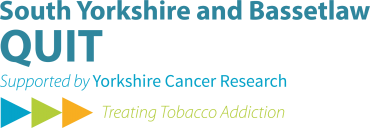Hospitals across South Yorkshire and Bassetlaw are joining forces this week in a region-wide approach to support people to quit smoking.
The campaign, which has already been hugely successful in London and Canada, could see as much as a 40% reduction in smoking related deaths in two years if it is rolled out in all the region’s hospitals.
It is the first region-wide programme for smokers to be backed by the partners in the South Yorkshire and Bassetlaw Integrated Care System (ICS) and is anticipated to significantly improve the lives of many thousands of people.
The programme, called QUIT, is based on clinical staff having a short conversation with people who have been admitted to hospital and who smoke, followed by prescribing medication and referring to specialist support.
Research shows that a hospital stay can be very effective in triggering quit attempts and that patients expect health professionals to raise the issue of tobacco dependence. By supporting smokers to stop while they are in hospital, with medicines such as nicotine replacement and advice from specialist stop smoking advisors, they are much more likely to stay quit.
Chief Executive of the South Yorkshire and Bassetlaw ICS, Sir Andrew Cash, said:
“As an ICS, we want for everyone in our region to have a great start in life and to support them to stay healthy and live longer.
“The QUIT programme is a great opportunity to make a real and lasting difference to our population. It is a tried and tested approach to helping people with tobacco dependency, giving them a chance to stay quit and improve their life chances.
“Our hospitals see a large proportion of our population as patients each year, many of whom are admitted for at least several days. It is estimated that 25% of hospital patients are current smokers. Their admission period is a unique opportunity during which they could be supported to make one of the single most effective changes possible to improve their long-term health. By working together across our region’s hospitals, we can have a consistent approach which will impact first hand on patients, their visitors, staff working in hospitals and their families.”
In Canada the campaign had a significant impact on not only health outcomes, but also on short and medium term hospital re-admissions and health chiefs are hopeful that tackling tobacco dependence will also contribute to relieving some of the current pressures on the local system.
Professor Des Breen, Medical Director for the South Yorkshire and Bassetlaw Integrated Care System, said: “Smoking is the single greatest risk factor in death and illness. The impact of quitting on people’s lives is enormous and the impact on our health and social system is just as big. It puts a considerable strain on services.
“We recognise that tobacco addiction is a chronic and relapsing disease, not a lifestyle choice and this initiative will support staff, as well as patients, to quit.
“We can’t underestimate the impact that a campaign like this across all our hospitals could make. We could literally save thousands of lives and millions of pounds.”
South Yorkshire and Bassetlaw Integrated Care System is one of 10 Integrated Care Systems chosen nationally to test a new way of working together locally.
Most of the partnership work between the NHS, councils and the voluntary sector takes place at a local level in each of the five places covered by the arrangements: Barnsley, Bassetlaw, Doncaster, Rotherham and Sheffield.
The ICS supports this work and addresses the issues that are best delivered through collaboration across the whole of South Yorkshire and Bassetlaw.
Background information:
- In SYB, the average rates of smoking-attributable deaths in England are much higher than the England average (319.5 per 100,000 compared to an England average of 272.0 per 100,000)
- The estimated cost to the public of smoking in SYB is £388 million - if we take account of output lost from early deaths, provision of NHS treatment, provision of social care, smoking breaks, sick days, household fires and passive smoking.
- Smoking is the single largest cause of ill health and preventable death in England and kills about half of all lifetime users.
- The QUIT programme is based on four steps:
Q – ask the question: all hospital patients should be asked if they are a current smoker.
U – understand their addiction: all hospital patients should be asked to exhale into a CO monitor and their result noted in patient records. This provides not only evidence of the conversation taking place, but provides a strong indicator of level of addiction which will support and indicate further treatment, but also contributes to triggering quit attempts.
I – inform patients about smokefree sites: all patients should be informed that the hospital site is smokefree and that patients and visitors are not permitted to smoke anywhere on site, but that they can access support for nicotine replacement.
T – initiate treatment: refer patients to smoking cessation support including advice and treatment as soon as possible, enabling them to quit during their inpatient stay where possible and ensuring appropriate ongoing support after discharge. Patients should be offered nicotine replacement support within 6 hours of arrival on the ward.
- In Canada:
Patients were 50% less likely to be re-admitted to the hospital for any cause, and 30% less likely to visit an emergency department within 30 days;
And smokers were 21% less likely to be re-hospitalized and 9% less likely to visit an emergency department over 2 years
